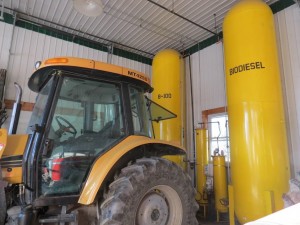26 Feb 2016
New Resource for Farmers: A Legal and Regulatory Overview of On-Farm Biodiesel Production in Vermont

State Line Farm in Shaftsbury, Vermont is an innovative bioenergy farm and research facility and worked with Institute for Energy and the Environment at Vermont Law School researchers on the On-Farm Biodiesel Production in Vermont: Legal and Regulatory Overview report.
A new report, On-Farm Biodiesel Production in Vermont: Legal and Regulatory Overview, conducted by the Institute for Energy and the Environment (IEE) at Vermont Law School reviews all Vermont state and federal regulations related to on-farm biodiesel production. Commissioned by the Vermont Bioenergy Initiative at the Vermont Sustainable Jobs Fund, the report aims to inform farmers about the potential laws and regulations surrounding on-farm biodiesel production.
“As statewide partners begin to find new ways to achieve the goals of Vermont’s Comprehensive Energy Plan, which identified biodiesel as a fuel that will help Vermont meet the 10-percent renewable transportation goal for 2025, the On-Farm Biodiesel Production in Vermont report provides a timely review of the regulations that pertain to home-grown biodiesel production,” states Ellen Kahler, executive director of the Vermont Sustainable Jobs Fund.
According to the report’s findings, “while several of the federal regulations are only triggered by high levels of production, there are a number of state laws and regulations that may be triggered by small-scale biodiesel production, such as state air emission provisions that establish lower thresholds when compared to the federal Clean Air Act (CAA). In addition, it is critical to understand the role biodiesel production plays in the definition of ‘farm’ and ‘farming activities’ for the purpose of states laws, such as Act 250 and the Current Use Program.”
IEE Global Energy Fellow Carla Santos coordinated the legal review with contributions from fellow IEE researchers Diana Chace, Christopher Cavaiola, Jeannie Oliver, and Jeremy Walker. The report is broken into five chapters that review tax legislation, site regulations, occupational safety and health, registration, and environmental legislation.
“Our institute’s research should help Vermont farmers understand the regulatory hurdles to producing biodiesel on the farm and help them convert a locally grown resource into economic and environmental benefits for Vermont,” said VLS Professor Kevin B. Jones, deputy director of the Institute for Energy and the Environment.
IEE researchers applied the legal review to three potential scenarios in the report, concluding with a convenient and accessible list of “do’s and don’ts” for farmers to use as a legal checklist as they move forward with producing biofuel in on-farm operations.
The complete On-Farm Biodiesel Production in Vermont: Legal and Regulatory Overview report is available on the Vermont Bioenergy Initiative website along with a variety of additional biofuel relevant reports and resources.
###
Since 2005, the Vermont Bioenergy Initiative has connected diversified agriculture and local renewable energy production for on-farm and community use by supporting research, technical assistance, and infrastructure development in emerging areas of bioenergy including biodiesel production and distribution for heating and transportation, oil crops for on-farm biodiesel and feed, grass for heating, and algae production for biofuels and wastewater management. The Vermont Bioenergy Initiative is a program of the Vermont Sustainable Jobs Fund, a non-profit organization created by the State of Vermont to help develop Vermont’s sustainable agriculture, renewable energy, and forest product businesses. For more information about the Vermont Bioenergy Initiative, visit www.VermontBioenergy.com.
The Institute for Energy and the Environment at Vermont Law School provides accessible resources on contemporary energy law and policy and is modeled on the fundamentals of a successful public policy consulting firm. The IEE distributes scholarly, technical, and practical publications; provides forums and conferences for professional education and issue development; and serves as a center for graduate research on energy issues, with environmental awareness. IEE research associates are selected from students in the energy and environmental programs at Vermont Law School, top-ranked in the nation for environmental law. For more information about the Institute for Energy and the Environment, visit vermontlaw.edu/iee.
19 Feb 2016
Biomass Energy exploration at Northeast Biomass Heating Expo in Burlington, Vermont March 30 – April 1

Northeast Biomass Heating Expo to be held in Burlington, Vermont March 30 – April 1
The 8th annual Northeast Biomass Heating Expo will be held March 30 – April 1 at the Sheraton Hotel and Conference Center in Burlington, Vermont. The Expo has become one of the fastest growing biomass thermal energy conferences in the United States, with almost 2,000 attendees expected this year. There will also be over 400 businesses, agencies and organizations present to contribute to the event’s comprehensive knowledge base of biomass thermal heating.
Biomass heating is a widely available source of renewable energy, which can help meet the heating needs of homes and businesses while displacing fossil fuels. The types of biomass most commonly used for energy include waste wood form the timber and wood products industries, as well as agriculture residues. These fuels can either be directly combusted, or they can undergo a variety of refining processes such as chipping or pelletization for use in a variety of home and industry heating applications.
Speakers, panel discussions, presentations, educational sessions and additional opportunities for tours and workshops will be available at this year’s expo. It is an excellent opportunity for networking with organizations, government, and across the broader biomass industry.
The Northeast Biomass Heating Expo is currently seeking co-hosts to help promote and be promoted at the event. Non-profit organizations, trade associations, community groups, and government agencies are all invited to become an event co-host. Co-host organization’s name and logo will be prominently displayed on conference communication outlets, and receive a free display tabletop at the event to share information with attendees. They will also be recognized during the opening and closing events and receive a special extension of the ‘Early Bird’ rate by one month.
Learn more about the Northeast Biomass Heating Expo at www.nebiomassheat.com.





